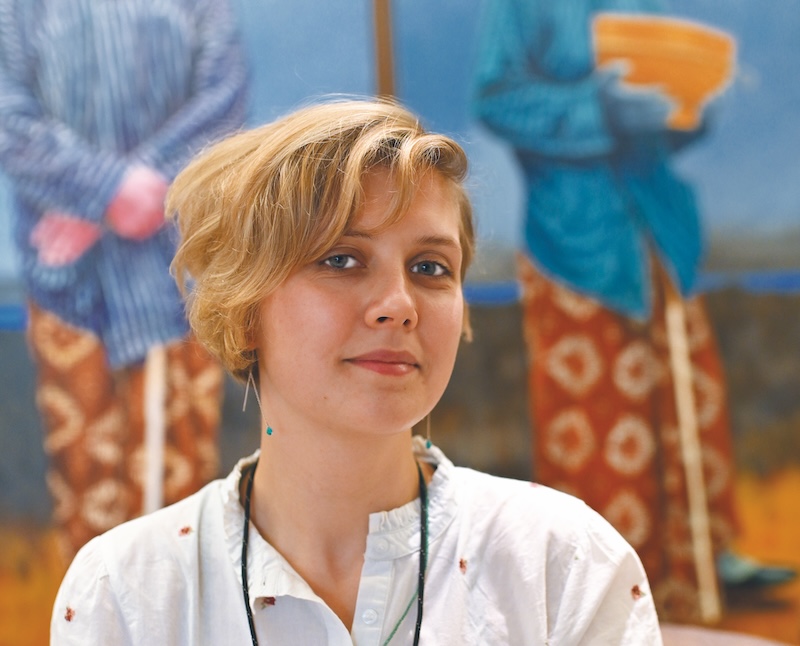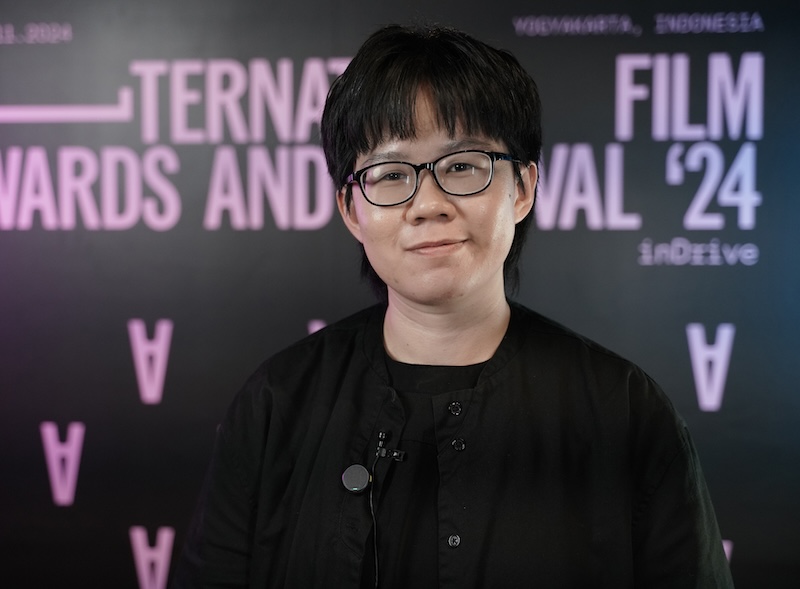
The festival promotes filmmakers from regions where they often lack access to opportunities or are less visible than those in the West (All photos: The Alternativa Film Awards & Festival)
Films help shape our perception of the world by unravelling new territories for viewers. “They teach us to respect and accept another’s culture even though it is different from ours,” says Liza Surganova, head of the Alternativa Film Project, which aims to make a change in society through art.
The global initiative is founded by inDrive, a ride-hailing service that started in 2013 and is available in over 749 cities across 46 countries today. The aim is to encourage individuals to grow, evolve and create by supporting and promoting movie makers from regions where they often lack access to opportunities or are less visible than those in the West.
Cinema is a very powerful tool that makes it possible to communicate important ideas to society and draw attention to local and global issues, says Arsen Tomsky, inDrive’s CEO and founder. The company wants to “find brave new voices and amplify them on a global scale”.
Surganova adds to that: “We want to put the spotlight on filmmakers from Central Asia and Southeast Asia (SEA), and from Latin America and Africa in the future. We believe there are so many talented people here with untold stories who need to be recognised internationally. The status quo in the industry is that to get recognition or be successful you have to go to Hollywood or Europe. I really feel there is much more powerful energy in the films I see from [this region]. This is like the future of cinema, in a sense. We want to provide some resources for it to develop faster and go further. It’s important for films to be noticed.”
She met with the media at the Alternativa Film Awards & Festival (AFAF) 2024 in Yogyakarta, Indonesia, before winners from 25 shortlisted entries — 13 full-length features and 12 shorts — were announced on Nov 29. The ceremony took place at the Gelanggang Inovasi dan Kreativitas in Universitas Gadjah Mada and was hosted by actor Hannah Al Rashid, a United Nations Sustainable Development Goals Mover for Gender Equality.
For over a week prior to its finale, AFAF held free public screenings of shortlisted productions, followed by discussions with their directors, as well as industry days at which filmmakers, producers and various organisations looked at SEA cinema on the global stage and movies that matter, shared case studies and talked about topics such as raising funds for films that make an impact and how to distribute them.
The non-profit Alternativa Film Awards, first held in Kazakhstan in 2023, supports emerging filmmakers from less developed screen industries who tackle social and cultural issues that affect the lives of people and local communities, and challenge injustice — a mission of inDrive. The film festival was added to the event, which turns the lens on SEA this year, to present bold, fresh work viewers can relate to.
Following its nomadic format, the Alternativa Film Project will focus on Latin America starting 2025. “The idea is to move from one place to another, each time spotlighting the region where it is at that moment and shifting our focus to problems that are acute there,” says Surganova.
What her team realised last year and has put right is that giving winners cash prizes is not enough if they want their works to have some lasting effect. “People need to see and talk about them. That’s why we came up with the festival, so they will know which films are being awarded.
“What is quite unique about our project is building bridges between these regions, because there are not so many institutions and events that actually bring together people from all those places. Although we come from very different parts of the world and diverse cultures, we have so much in common. You can see that in films; you can see the challenges filmmakers are facing all over the global south.”
Making the event biennial also allows them time to research, prepare and get a better idea of the industry in a new region where the local approach to work may differ from theirs. “We respect and accept that our local team understands many things much better than we do. Also, it takes time to build trust.”
This year’s six winners for the five categories of competition are: Manohara K for Bird of a Different Feather (under Spotlight); Pham Ngoc Lan for Cu Li Never Cries (Future Voice); Atiye Zare Arandi for Grand Me (Alter); P S Vinothraj for The Adamant Girl (Nativa); and Mickey Lai and Nguyen Duy Anh for WAShhh and A Cleaning Service, respectively (Shorts). The feature directors received US$20,000 (RM89,159.58) each, while the short film winners got US$10,000 each.
Thai director Pat Boonnitipat’s feature, How to Make Millions Before Grandma Dies, picked up a special Resonance Award that celebrates outstanding success with the audience. Surganova, who presented him the non-monetary prize, says his touching work centred on duty, care and money resonates with growing populations across the globe. “It treats the complex issues of looking after your elders, having sincere loving relationships and finding your place in the family with a light tone and humour.”
She thinks a movie can open something new to viewers, whether it is culture, a way of life they have not seen before or a problem they never imagined existed. Pointing to Bird of a Different Feather, about a girl living with albinism, she says while she knows about the condition, “I had never thought about how you would feel if you were a completely white-haired girl born in an Indian village. How does it feel to be so different, to be Indian but look like a European and be bullied for that?”
Last year’s shortlist comprised several films that highlighted bride kidnapping, a horrid problem that persists in Kazakhstan and Kyrgyzstan. Men being pushed by their families to get married would just go out to the street and kidnap a girl or woman whom they might not even know, whisk her away and force her into marriage. Some victims are raped. Even if they manage to escape, their families would not accept them back because of the shame surrounding what has happened.
Surganova sees the Alternativa Film Project as a channel for stories and talent from the global south to be recognised widely, and treated with the same respect as Western directors, with stories being shown and more resources for those from, say, Kazakhstan, Indonesia or Venezuela to work with.
But big challenges, much the same in every country, continue to pose problems for independent creators, the key ones being lack of funds and distribution avenues. Often, they cannot obtain financial aid for a project in their own country, for various reasons — among them censorship, a difficult political regime, religious ideology or even gender issues. Private business also may not believe in investing in movies.
dsc_3930.jpg

So they are forced to go outside of their own country to find money. It takes resources to travel and learning how to pitch a project to international producers is tough. Lack of professional training or no access to such education is another setback.
The AFAF’s monetary awards provide welcome support: The Nativa winners for Nepali film No Winter Holidays last year used the money to distribute their film at home. There is also education: At its Impact Lab, project authors learn how to promote their work and “create a roadmap for solving the problems they address”. Labs are running in Central Asia now and Alternativa is studying plans to have one in Indonesia to drive resources to Southeast Asian filmmakers.
Surganova has faith in the power of partnerships. “I believe that to have really massive and sustainable online distribution, we need to first find partners willing to take those films and bring them to an audience that is already existent and quite big.
“I think this will be our next step: mapping out those partners who share our values and with whom we can share the films. Then we will see how audiences react to that. Because, building our own would [require] a lot of money and time.”
Submissions for the 2024 Alternativa film awards were received from 14 Asian countries across 20 languages. The seven-member jury comprised Anand Gandhi of India; Steffi Niederzoll (Germany), Carol Misorelli (Brazil), Asmara Abigail (Indonesia), Kamila Andini (Indonesia), Amir Masoud Soheili (Iran) and Katerina Suvorova (Kazakhstan).
Suvorova was the 2023 Alter Award winner for Qoryqpa (Streets Loud with Echoes), about young political activists calling for change in their “too-regulated” state. The documentary was sparked by the 2018 fatal stabbing of Denis Ten, the first Kazakh figure skater to win an Olympic medal, by two men who tried to steal his car mirrors in his home city Almaty, where she lives too.
The Alternativa Film Project brings good money to Indonesia, as it did in her country last year, she thinks. As an independent creative who has to juggle family and film, winning was “proof that you are not wrong putting your life and energy into a project for five years. It is also emotional support that
shows my work is needed. Sometimes it’s challenging to keep doing this. There are so many obstacles to jump over”.
Another plus is that when local-made films are shown at home, “the reaction is 10 times deeper. People cry, people laugh when they recognise every small thing someone from another culture may not”.
Her goal is to create work depicting what the young in her country face. “Kazakhstan is struggling in the international arena because it still has connections to the Soviet Union. We are sometimes included in Russia’s political narrative. I want people to see a bit of the reality there. As a post-totalitarian country, we don’t know much how to be horizontally united, how to get together without violence.”
Qoryqpa is her personal perspective, but there were direct observations of people meeting to fight for reform, she shares.
The Alternativa Film Project, a unique and visible inDrive move to expand its business into areas that encourage individuals to follow inspiration and their dreams, is part of the company’s social responsibility and sustainability efforts. Chief of staff Egor Fedorov says supporting emerging talents and amplifying their stories “inspire global audiences to take action, think critically and continue to innovate”.
Future plans for Indonesia and Southeast Asia include making the region a second hub for Alternativa. Next year, it will partner Docs by the Sea to hold the Impact Lab 2025, with the final event featuring networking and project presentations in Bali.
Winning works reflect contemporary realities
The Alternativa Film Awards and Festival presented prizes for full-length works under four categories — Spotlight, Future Voice, Alter, Nativa — and two for Shorts. Spotlight draws attention to movies that place overlooked social issues at the fore, while Future Voice honours emerging creators whose first or second feature shows potential to drive change within the industry and society at large.
azk03485.jpg

Alter celebrates films that inspire social transformation by addressing critical concerns, among them human rights, migration and environmental challenges, and Nativa recognises creations that delve into national or cultural identity, showcasing content that puts regions and communities on the global map. Shorts support directors with a clear vision for change.
Spotlight winner Bird of a Different Feather by Indian director Manohara K is a coming-of-age tale about a 12-year-old with albinism, who turns her life around after contemplating ending it because of the taunts by society and her classmates.
Pham Ngoc Lân picks up the Future Voice trophy with Cu Li Never Cries. It zooms in on newly-widowed Mrs Nguyên , who inherits a pygmy slow loris from her long-estranged husband in Germany. She returns home to Hanoi, Vietnam, with his ashes to find her niece preparing for her wedding and has to reconcile past memories with a lonely present in this evocative black-and-white film.
Grand Me, directed by Atiye Zare Arandi, bags the Alter prize with its story about a young Iranian girl with divorced parents, who is under her grandparents’ care. Melina wants to live with her mother and decides to take her custody case to court, blissfully unaware of what will happen next.
The trailer for The Adamant Girl shows silent, gritty 21-year-old Meena being driven to a distant village shaman to break the “spell” cast by a lower-caste boy she has fallen for. “The shaman is the first step. If that doesn’t work, it’s honour killing,” says Nativa-recipient P S Vinothraj, an award-winning child actor-turned-director whose work examines regressive ideology and how religion and chauvinistic beliefs impact ordinary lives.
Malaysian director Mickey Lai’s WAShhh, based on her own National Service camp experience over a decade ago, was one of the Shorts winners. The other is A Cleaning Service by Nguyen Duy Anh, which “explores labour, gender and societal norms and challenges perceptions while celebrating resilience”.
WAShhh tells what happens when a camp teacher summons a Chinese girl to lead her multiracial female trainees to wash soiled sanitary pads in the middle of the night, as that would “solve” a possession incident that had occurred. It is a Malay tradition to remove blood stains before disposing the pads so djinn (a malevolent demon spirit) would not come and disturb them.
“The trainees fell apart because they started blaming each other. They said, ‘Oh, the Chinese and Indian girls did not wash their pads, that’s why the rasul incident’. From here, we can see when an authority tries to oppress a group, the different races start to [fight].
“I’m not sure if I can say this, but I will: Most of the time, the government uses race, religion and the system of cultural education to segregate the people in the country,” says Lai, 29. The triple ‘H’ in her film title alludes to the teacher’s warning to keep their experience a secret.
“I had no idea why; it felt like taboo to talk about it. But I think we should talk about our feelings and share our insights rather than keep them to ourselves to avoid misunderstanding, especially in a multiracial country.”
WAShhh is her third work after The Cloud is Still There (2020) and A Worm, Whatever Will Be, Will Be. It premiered at the 77th Locarno Film Festival and won Best International Short Film (Pardi di Domani section).
She did her master’s at London’s MetFilm School and takes on various roles — TV production, script supervisor, editor and part-time lecturer in film: “We need to survive.” A Worm, which won the Next New Wave Jury Award at the SeaShorts Film Festival 2022, is a documentary about her grandmother, shot in Perak, in the final days before her death.
“It was during Covid. She had dementia and I documented our interactions every day and her physical changes. She believed worms were living under her skin. There’s nothing unique about her life, that’s why I wanted to shoot it. I like mundane stuff, ordinary things,” adds Lai, whose name Mickey is a nod to the iconic mascot of the Walt Disney Company.
Compatriot Ekin Kee Charles — “We’re friends. The industry is small and we support each other,” she says, pointing to Lai — was a Shorts finalist for Peaceland, about three elderly women travelling to town for groceries and to persuade one of their daughters to return to their village.
“It’s a light-hearted story about my community and the people I grew up with, about rural women defying their age and having the time of their lives. My village in Kota Marudu, Sabah, is called Damai, which translates as ‘peace’,” says Kee, 27, a Kadazan-Dusun who freelances as a script supervisor
to support her creative pursuits.
Her debut short film, Pace, which won the BMW Shorties 2019 grand prize, centres around a girl who desires to become a boy. “I like to focus on community because that’s where my voice is.”
This article first appeared on Dec 23, 2024 in The Edge Malaysia.


